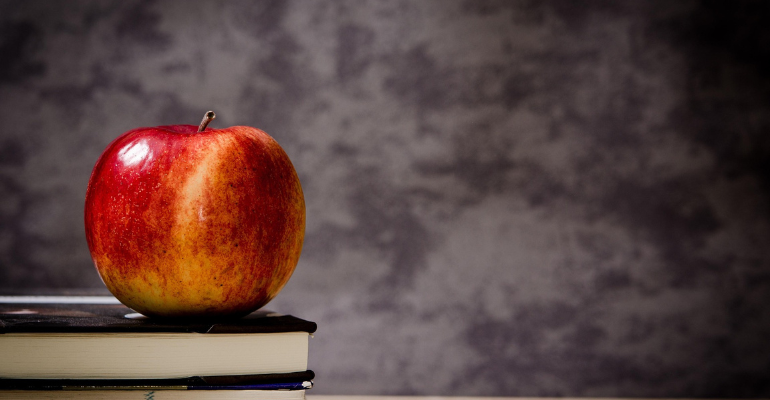In the name of Allāh, ar-Raḥmān (the most merciful), ar-Raḥīm (the bestower of mercy).
All praise is for Allāh, the Lord of the worlds. May salutations of praise and peace be upon our Prophet, his family, companions and followers.
Respected teacher, ahead of you is a new academic year. Classrooms open their doors to students at all stages – new students whose eyes glitter with excitement; returning students who have grown and matured since last year, and of course, students who have since graduated, left your classroom in pursuit of their dreams, following the path that Allāh has written for them.
Yet this does not change your duty, for you are different from teachers in other schools. [1]
Last year passed with its challenges and difficulties, and its moments of joy and contentment, and Allāh alone knows what lies ahead. However, one thing remains constant: your responsibility.
The responsibility of a teacher is never confined to books and grades. In schools such as this, your role has two dimensions: ta’līm (teaching) and tarbiyah (cultivation).
‘Ta’līm’ in its basic sense is the transfer of information from teacher to student.
‘Tarbiyah’ is much more holistic. It is ‘the gradual development of a person, through the ascending steps of growth, each according to their level.’ [2]
The word ‘tarbiyah’ shares its roots with the blessed name of our Lord: ‘Ar-Rabb’ – the one who nurtures, sustains, and cultivates us through his countless blessings, enabling us to grow and develop in every aspect: physically, emotionally, and spiritually.
Respected teacher, your role of tarbiyah is therefore much deeper and far more enduring.
The distinction between the two roles is profound. The salary of a teacher may stem from fulfilling the first role of education. However, the reward with Allāh, his divine recompense, is connected to the second.
The outcomes of ta’līm are easily quantifiable. They are measured by exams, grades and certificates. The fruits of tarbiyah, on the other hand, are the development and growth of a young student, through ages and stages, to eventually become a grounded Muslim man or woman.
Educational outcomes, though important, are temporary. However, the fruits of your nurturing and cultivating remain with the student for life.
Ta’līm builds the individual, but tarbiyah builds the society.
Respected teacher, your role in a Muslim school as a cultivator is immense, carries a heavy responsibility and a greater reward. It carries no certificate or formal recognition, but its outcome is priceless: raising the future generation of Muslims who will value their Islām and live according to its morals.
Allāh reminds us of the example of Prophet Ibrāhīm, ‘alayhi as-salām, from whose offspring arose prophets and messengers. He described him as:
{إِنَّ إِبْرَاهِيمَ كَانَ أُمَّةً قَانِتًا لِّلَّهِ حَنِيفًا وَلَمْ يَكُ مِنَ الْمُشْرِكِينَ} النحل: ١٢٠
{Indeed Ibrāhīm was a nation, devoutly obedient to Allāh, inclining towards the truth, and he was not of the mushrikūn (polytheists)…} [16:120]
Prophet Ibrāhīm cultivated an entire generation of prophets and messengers, and so this one man, who was alone, was described by Allāh as ‘a nation.’ Before teaching others, he himself was ‘devoutly obedient,’ always ‘inclining towards truth’ and shunning the practices of shirk, kufr and disobedience.
Likewise, Allāh described his Messenger Muḥammad ﷺ, who cultivated the most pious generation of Muslims – the Companions. The Qur’ān guides us towards emulating him as a role model:
{لَّقَدْ كَانَ لَكُمْ فِي رَسُولِ اللَّهِ أُسْوَةٌ حَسَنَةٌ لِّمَن كَانَ يَرْجُو اللَّهَ وَالْيَوْمَ الْآخِرَ…} الأحزاب: ٢١
{Indeed, in the Messenger of Allāh you have a good example to follow for the one who hopes for [the meeting with] Allāh and the Last Day…} [33:21]
The Prophet ﷺ not only taught knowledge but also refined character, guiding his companions gradually according to their circumstances and capacities.
ٌRespected teachers, whilst your ta’līm has a fixed time, a lesson scheduled within a timetable, your tarbiyah is much more subtle. It is often delivered in the smallest of moments – a greeting in the morning, a smile at the door, a word in the corridor, a correction after a mistake, an expression of displeasure when seeing a sin, or a word of advice when required — moments often more impactful than an entire lesson.
Respected teachers, your tarbiyah does not begin with books and words, but it begins with your actions as a role model; the way you dress as a Muslim and how you carry yourself.
A successful Muslim teacher finds a way to remind their students of Allāh and weaves reminders into the curriculum: beginning lessons with bismillah, illustrating teaching points with examples from Islam, emphasising how science proves the greatness of the Creator, and highlighting the achievements of Muslim mathematicians, historians, writers and discoverers.
Through this, your teaching is transformed into ‘ibādah (worship).
Respected teachers, as you embark on this new academic year, fulfil this dual responsibility. Teach and nurture, educate and cultivate.
I end with the hadith of our Prophet ﷺ who said:
Each of you is a shepherd, and each of you is responsible for his flock. [3]
May Allāh allow us to fulfil our responsibilities, and may Allah bring goodness through your hands and efforts.
Written by,
Abul Abbaas Naveed Ayaaz
Nelson, Lancashire.
9th Rabi’ al-Awwal, 1447h
Corresponding to 1st September, 2025
Footnotes
[1] The origin of this article is a reminder given to teachers at Edenfield Girls’ High School (Sunnah Campus), in Nelson, during the 1st day of the academic year – 1st September, 2025.
[2] Paraphrased from ‘Sharḥ al-Usūl ath-Thalātha’ by Shaykh Ṣāliḥ Āl ash-Shaykh.
[3] Narrated by ‘Abdullah ibn ‘Umar; Collected by al-Bukhārī & Muslim.


Masha Allah, This writing has really helped me and made me understand how to teach especially in accordance with the teaching of our beloved prophet. May Allah increase your knowledge, Iman, Guidance and good health. And protect you from all evil. Thank you.
May Allah bring benefit through your teaching.